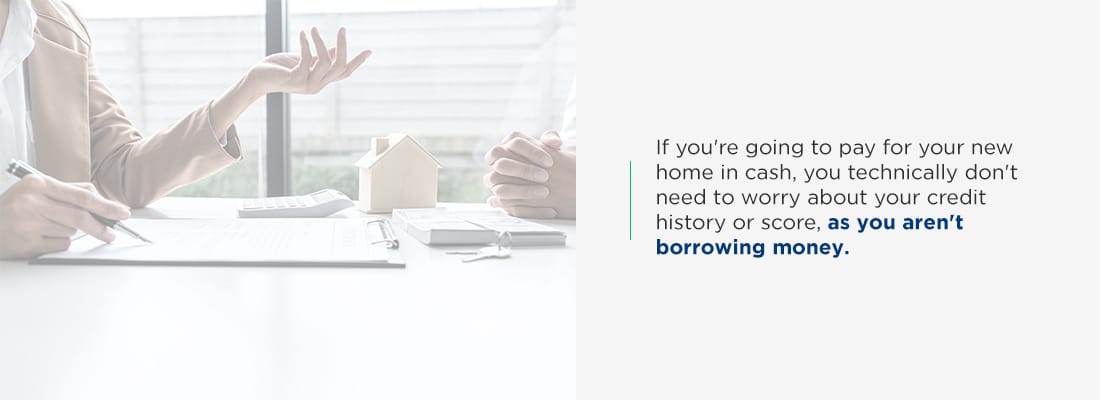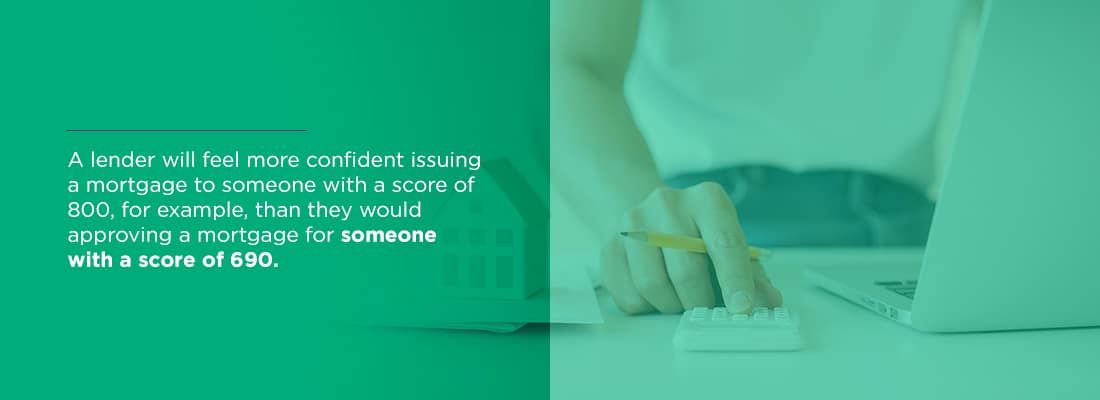Buying a home is a major commitment, both on the part of the buyer and the lender. As a buyer, you agree to take care of your new home and repay your mortgage based on the terms of the loan. The lender is taking a chance by providing you a significant sum of money upfront, with the expectation that you’ll pay it back with interest.
Lenders use several factors when deciding whether or not to lend money to an individual or group of people. One of those factors is the borrower’s credit history and credit score. Learn more about the importance of your credit history when getting a mortgage and what you can do to make the most of yours.
Table of Contents
- What is a Credit History?
- How Important is a Credit Score?
- How Does Your Credit Affect Interest Rates?
- What Happens to Your Credit After Approval?
- Other Factors to Consider When Buying a Home
- How to Improve Your Credit Score
- Apply for Home Loan Insurance Today
What Is a Credit History?
Your credit history is a snapshot of how you’ve used money and loans throughout your life. Generally, your credit history includes the following:
- The number of loans or credit accounts you have:Your credit history includes accounts that are currently open as well as closed accounts. Examples of closed accounts include a loan you’ve paid off or a credit card you canceled.
- The amount you owe on each account:Your credit history also reflects how much you owe on each account. For example, you might have a student loan with a principal balance of $15,000, and you might owe $2,500 on a credit card. If the account has a limit, such as a credit card with a limit of $7,000, that will also be part of your credit history.
- The types of accounts you have: Loans typically come in two forms — revolving and installment. Installment loans include personal, auto and student loans. Credit cards are common examples of revolving loans.
- Your payment history: Whether you pay on time, have made late payments or have missed payments will all be part of your credit history. If you have any loans that went into collection or that were charged off, those will appear on your credit history, too.
The information that makes up your credit history is contained in a credit report. There are three bureaus that put together credit reports. What gets reported by one bureau might not get reported by another, which can affect the accuracy of your credit history. In addition to details about your credit and loan accounts, your credit report will contain identifying information, such as your current address and a list of your previous addresses, your birthdate and your Social Security number.
How Do Lenders Use Your Credit History?
Lenders look at your credit history to get a sense of your relationship to loans and money in the past. If you have a very short credit history or don’t have one at all, a lender doesn’t have much to work with. They have no way of knowing whether you’re likely to pay your loan as agreed or if there’s a high risk that you’ll default on it.
If you have a history of on-time payments and a variety of loan accounts, a lender might feel more confident in letting you borrow money. Lenders also look at how much you owe when making a decision about you. If you have a lot of outstanding debt, they might be hesitant to offer you more credit. Along with approving you for a mortgage, a lender might also offer you a lower interest rate or let you borrow more money if you have a strong payment history and don’t currently owe a lot of money.
How Important Is a Credit Score?
Your credit history plays a significant role in determining your credit score, a three-digit number ranging from 300 to 850. If you’re interested in getting a mortgage, your credit score is important, as it lets a lender see at a glance how you’ve handled money and loans in the past. The higher your score, usually the better the terms you’ll get on a mortgage.
Certain parts of your credit history influence your score more than others. Usually, the following five factors determine your total score:
- Payment history: Your payment history has the biggest impact on your score, accounting for 35% of the total score. That makes sense, as a lender may hesitate to let someone who regularly misses payments or pays late borrow money.
- Amount you owe: How much you owe on existing loans also has a considerable impact on your score, accounting for 30% of the total. A lender is likely to be nervous about lending money to someone who already has a significant amount of debt.
- Length of history: The longer your credit history, the better, although the length of your history only accounts for 15% of your total score. If you’re interested in getting a mortgage one day, it may be a good idea to open up your first credit card or get another type of loan when you’re relatively young.
- Types of accounts: The type of accounts you have play a smaller part in determining your score. Credit mix accounts for 10% of your total score. While you don’t have to have one of every possible type of loan, it’s useful to have a variety of accounts in your history, such as a credit card and a personal loan, or a credit card and auto loan.
- New credit: New credit accounts for 10% of your score. Multiple new accounts on a credit report can be a red flag to lenders. They might wonder why someone opened several credit cards or took out multiple loans at once.
Your credit score has a part in determining how much interest you pay on a loan and can also play a role in the type of loans you’re eligible for.
What Is a Good Credit Score for a Home Loan?
If you’re going to pay for your new home in cash, you technically don’t need to worry about your credit history or score, as you aren’t borrowing money. But if you plan to get a mortgage to pay for part of your new home, your credit score is going to play a bigger role. The credit score you need to qualify for a home loan depends in large part on the loan you’re applying for and the amount you hope to borrow.
Conventional mortgages typically require higher credit scores than government-backed mortgages. A lender assumes more risk when issuing a conventional home loan, so it’s important for them to only lend money to people with strong credit scores. The minimum credit score for a conventional mortgage is around 620. But a borrower is going to get better rates and the best terms possible if their score falls in the “Excellent” range, meaning it’s above 740.
A borrower can qualify for certain government-backed mortgages, such as the FHA loan program or VA loans, with a much lower score. The FHA loan program may also accept borrowers with scores as low as 500, but those borrowers need to make a down payment of at least 10%.
How Does Your Credit Affect Your Interest Rates?
The higher your credit score, the lower your interest rate may be on a mortgage or any other type of loan. A lender will feel more confident issuing a mortgage to someone with a score of 800, for example, than they would approving a mortgage for someone with a score of 690. To reflect that confidence, the lender will charge less for the loan.
At first glance, the difference between the interest rate someone with a score of 800 is offered and the rate someone with a score of 690 is offered might not seem like much. For example, someone with a score of 800 might get a rate of 4%, while a person with a 690 score might be offered a rate of 4.5%. But over the 15-year or 30-year term of a mortgage, that half of a percentage point difference adds up to thousands of dollars.
Depending on the type of mortgage you apply for, you can qualify for a better rate with a lower score. For example, if you apply for an FHA loan with a score of 580, you’ll get a higher rate than someone who applies with a score of 700. But if the person with a score of 700 applies for a conventional mortgage, they are likely to get a higher rate on the conventional loan than on an FHA loan.
What Happens to Your Credit After You’re Approved for a Loan?
Your mortgage will appear on your credit reports and will affect your credit score. Overall, adding a mortgage to your credit history is a good thing. But there are a few things to note. One is that initially, your score might drop after you get approved for a mortgage and close on your home. When you get a mortgage, you add a significant amount to your total debts owed, which accounts for nearly one-third of your credit score. You also add new credit to your report, which accounts for 10% of your score.
Don’t panic if you see your score drop after taking out a mortgage. If you had a relatively high score to begin with, the drop is likely only to be a few points. You’re also going to improve your score relatively quickly. As you start paying off your mortgage, the lender that owns it will report your payments to the credit agencies. After a few months of on-time, consistent payments, you’ll have bolstered your payment history on your report.
Another reason not to panic about an initial drop in your credit score is that your mortgage will boost your score over time, provided you continue to pay regularly. Mortgages are examples of installment loans. You borrow X amount and as you pay it down, the amount you owe decreases. That reduces the total amount owed that shows on your credit reports, ultimately improving your score.
A mortgage also gives you a more diverse credit portfolio. If you previously had mostly credit cards, adding a mortgage increases the variety of your credit mix, which can boost your score.
Other Factors to Consider When Buying a Home
While your credit score is important, it’s not the only factor that determines the interest rate you’re offered or whether a lender approves your application or not. A few other things that influence your mortgage include:
- Your down payment: How much you can afford to put down influences the interest rate you’re offered as well as the type of mortgage you qualify for. If you plan on taking out a conventional loan, your down payment can range from 3% to 20%, but only borrowers who meet certain requirements can qualify for a 3% down payment. Usually, the more you put down, the lower your interest rate.
- Market conditions: The overall market also influences the rate you get offered on a home loan. When rates are high, your interest rate will be higher, even if you have the best credit possible. When rates are low, you can qualify for a lower rate than you would otherwise. How competitive the market is also influences your mortgage options. It can be more challenging to qualify for a mortgage with a low down payment or lower credit score when there’s a lot of demand from buyers and few homes available for sale.
- Mortgage options: Depending on the type of mortgage you apply for, you might not need to have a credit score in the “excellent” or “very good” category. Certain government-backed loan programs are available to borrowers with less-than-stellar credit. If you have a lower score and don’t have much for a down payment, an FHA loan, for example, might be your best option. On the flip side, if you plan on buying a very expensive home and need to take out a jumbo mortgage to do so, you’ll need to have a higher-than-average credit score and a sizable down payment.
- The price of the home: How much the home costs compared to how much you want to borrow also influences whether or not you get approved for a mortgage. The pricier the home, usually the bigger the risk to the lender. If you’re buying an inexpensive property, you’re likely to get a better interest rate, especially if you’re able to put down a large payment upfront.
- Your income: A lender is going to ask you how much you earn and ask you to verify your income before they agree to lend money to you. They want to ensure you can pay back what you’ve borrowed. The higher your income and how it compares to your total debt influences how much a lender will let you borrow and the interest rate they charge.
- Type of interest: The type of interest rate your mortgage has is another thing to consider. Mortgages with adjustable rates have lower rates at first, but those rates can increase when they adjust. A fixed-rate mortgage might charge a slightly higher rate than an adjustable-rate loan, but you have reassurance the rate will remain the same for the life of the home loan.
- Length of the mortgage:How long you have to repay the mortgage also influences your rate. Mortgages with longer terms, such as 30 years, usually charge higher rates than loans with shorter terms, such as 15 years.
Your lender is likely to look at the big picture, taking your credit score, income, down payment and other factors into consideration before making a lending decision.
[download_section]
How to Help Improve Your Credit Score
If you don’t have a credit history, have limited credit or have a poor credit history, you’ll want to focus on improving your credit before you apply for a mortgage, even if you plan on applying for a government-backed loan. Fortunately, there are a few ways you can boost your credit.
If you don’t have a credit history at all, the first thing to do is open your first account. You have a few options for doing that:
- Get a secured credit card:Secured credit cards help people with limited credit histories or with poor credit boost their scores. When you apply for a secured credit card, you put down a deposit, such as $500. The deposit acts as collateral on the card, reducing the risk to the lender.
- Apply for a credit builder loan: Another option is to apply for a credit-builder loan from a credit union or bank. Credit builder loans are slightly different from other types of loans. In effect, it works backward. You don’t get the borrowed money upfront. Instead, you pay the lender each month, and it holds your payments in an account. Once you’ve paid off the full balance of the loan, you can receive the funds and use them as needed.
- Apply for a store credit card: If a credit-builder loan or secured credit card doesn’t appeal to you, another way to establish credit is to apply for a store credit card. Be cautious with this approach, though. You don’t want to charge so much on the card that you have trouble paying off the balance and end up with missed or late payments.
- Ask someone to co-sign with you:Finding a co-signer is another way to qualify for a loan with a limited credit history. Your co-signer is a co-borrower, meaning they are responsible for paying the loan if you fall behind. Make sure the person who agrees to co-sign with you understands the risks they are taking on before going forward.
If you do have a credit history but your score isn’t what you want it to be, there are things you can do to improve your score. It might take a while to get your credit where you want it to be, so it can be useful to check out your credit report months or years before you plan on buying a home:
- Pay on time:Remember that payment history is the big one when it comes to your overall score. If you’ve fallen behind on certain accounts, do whatever you can to make them current. Commit to paying every other account on or before the due date.
- Avoid new credit accounts: Try to avoid opening lots of new credit accounts, as doing so will cause your score to drop. It’s especially important to avoid new accounts while you wait for final approval on your mortgage, as opening a new credit card or taking out a different loan during that time can disrupt the approval process.
- Keep your debt balances low: How much you owe overall plays a major part in the calculation of your credit score. If you currently have a lot of credit card debt or student loans, try focusing on paying them off or significantly reducing the balance before you apply for a mortgage.
Apply for a Home Loan With Assurance Financial Today
Is your credit score where you want it to be? Even if it’s not, our helpful loan officers can help you decide the what’s best for your home buying goals. You can start the application process online with Assurance Financial. A loan officer will then get in touch to finalize your application.
Linked Sources:
- https://www.myfico.com/credit-education/whats-in-your-credit-score
- https://assurancemortgage.com/conventional-loans/
- https://assurancemortgage.com/va-loans/
- https://assurancemortgage.com/fha-loans/
- https://assurancemortgage.com/how-to-build-credit-to-get-loan/
- https://assurancemortgage.com/apply/










